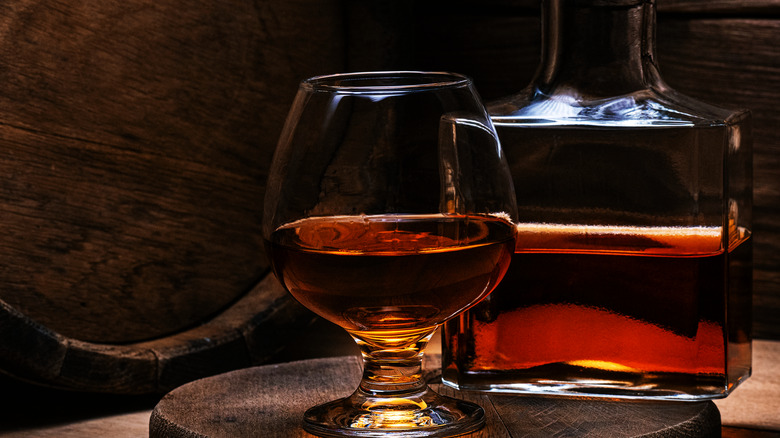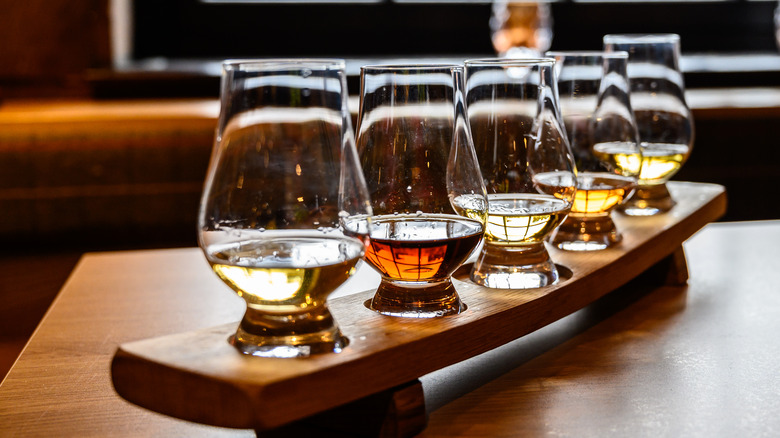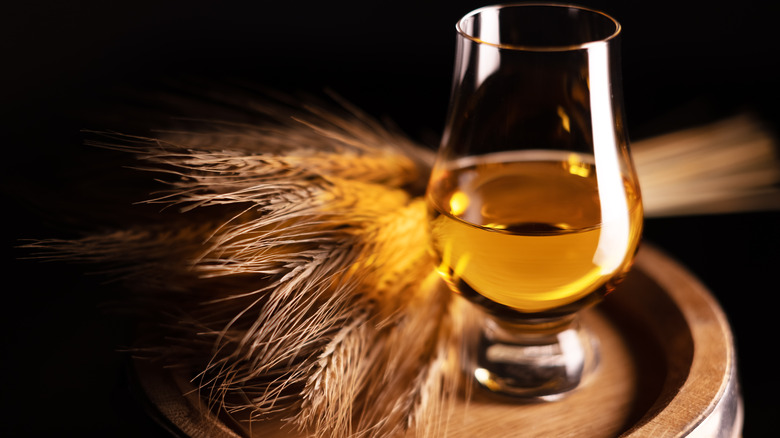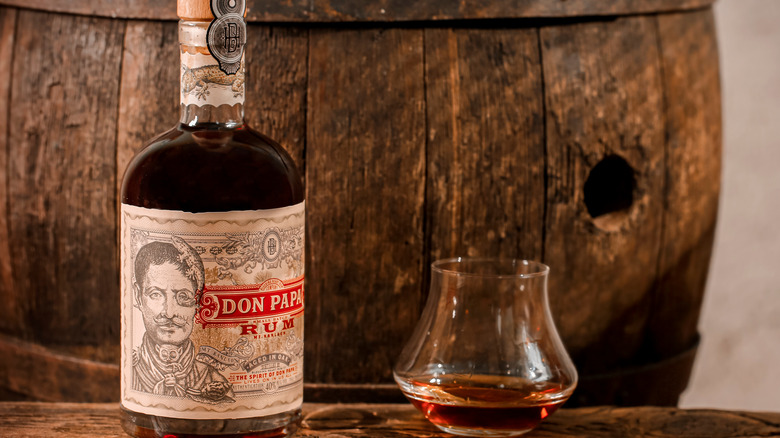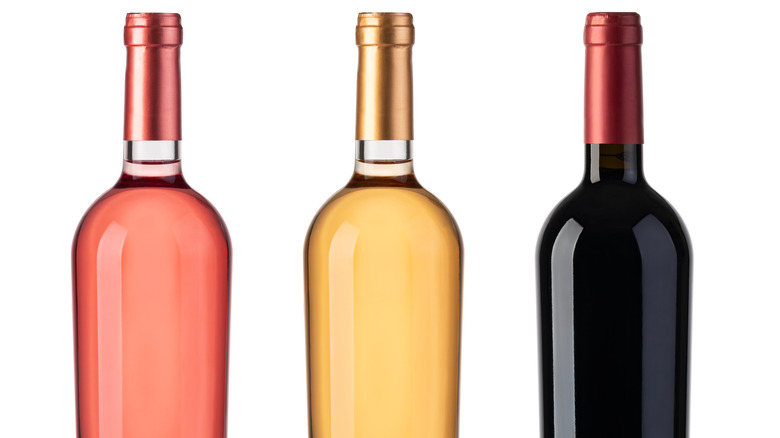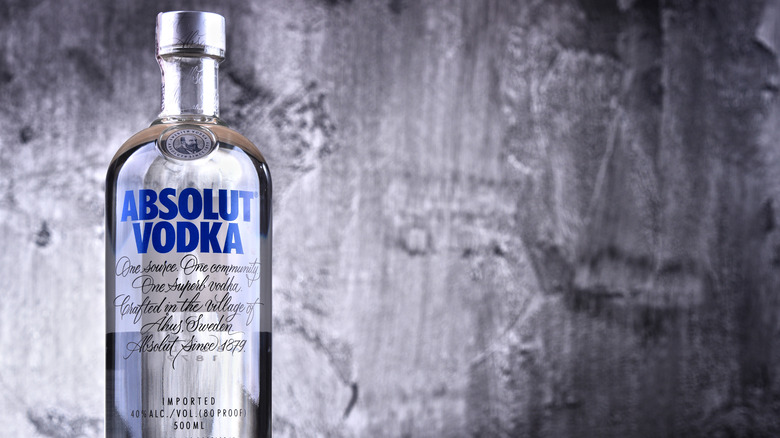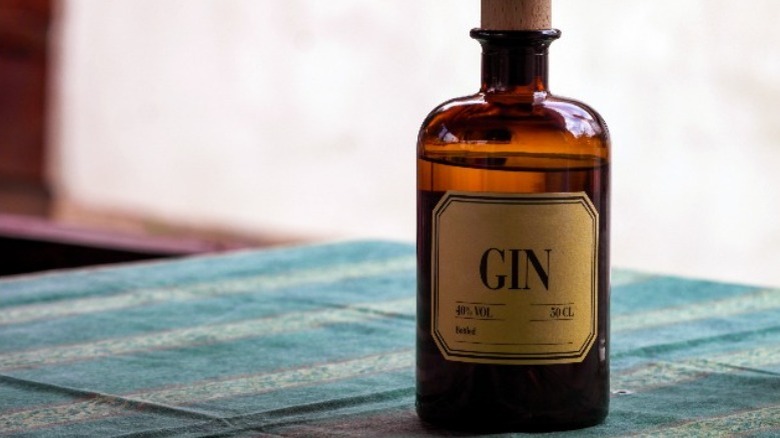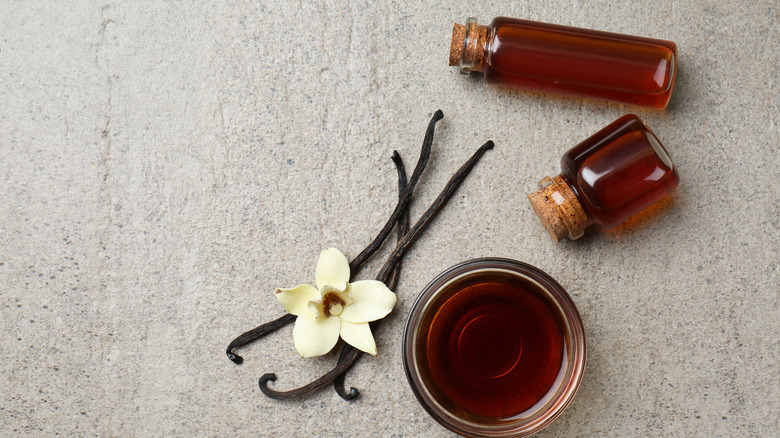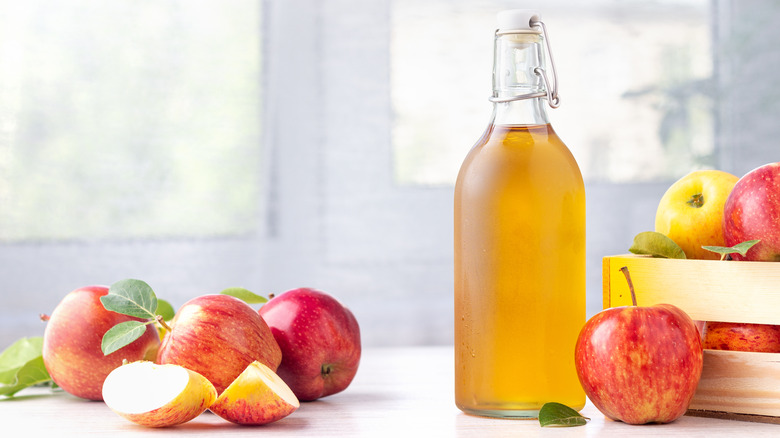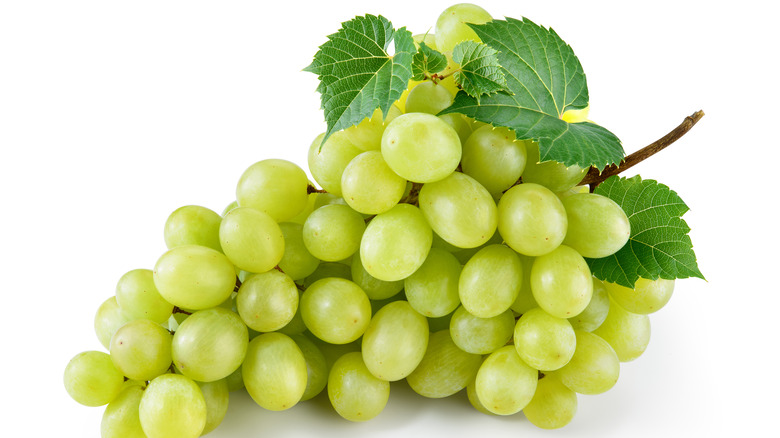10 Best Substitutes For Brandy
Brandy is a liquor made from fermented fruit. Similar to wine, it's typically made from grapes, but can also be made from other fruits such as apples, apricots, cherries, or peaches. Like its rich amber color, brandy tends to have a strong flavor along with some bitter notes.
Brandy may be distilled from fermented fruit juices, but when it comes to brands and styles, it can get a bit confusing. For example, Cognac may be considered a separate liquor, but it's also a type of brandy. For a brandy to be a Cognac, it must be made in the Charente and Charente-Maritime departments of Southwest France, or, the Cognac region (via Thrillist).
Brandy is traditionally revered as an after-dinner drink, or digestif, to help support digestion, per Thrillist, but the smooth liquor can be used for more than sipping. Brandy can be used for making cocktails, cooking, or baking. If a recipe calls for brandy and you don't have any on hand, there are plenty of substitutions you can try.
1. Cognac
Since Cognac is a kind of brandy, it only makes sense that it will make a decent recipe substitute. This liquor must be aged in oak barrels for a minimum of two years to make it a Cognac, and the aging process gives it a similar smoky taste to bourbon (per Food Champs). White grapes are used to make Cognac and they can only be grown in specific regions of France, as previously mentioned.
Because making the Cognac must adhere to strict guidelines, including where it's created, it's realistic that the price of Cognac is going to be more expensive than brandy, so this may be one substitute you're not willing to make. But, if you're caught in a pinch and Cognac is all you have on hand, it will work as well as any alternative. For best results, use an equal amount of cognac, a 1:1 ratio, in place of brandy for your recipes.
2. Whisky
Whisky is an alcohol that isn't for the faint of heart as it has a strong, distinct flavor. Whisky is usually made from grains, such as malted barley or wheat, and goes through a fermenting process before it's distilled (per The Scottish Whisky Experience).
Whisky comes from the Highlands of Scotland and according to The Scottish Whisky Experience, this alcohol can be dated back to 1494. There are many types of whisky and, depending on where it's produced, each will have different characteristics such as flavor notes, color, and how it must be referred to.
A good substitute for brandy, whisky can be used for cocktails, desserts, and savory dishes, but it's important to consider that, because of its strong flavor, it will likely alter the taste of what you're preparing. Organic Facts shares that you can balance the flavor by adding a squirt of simple syrup or fruit juice when substituting whisky for brandy.
For best results, use an equal amount of whisky for brandy, a 1:1 ratio, in your recipes, per Recipe Marker.
3. Bourbon
For the novice, bourbon may seem like its own alcoholic spirit, but it's actually a type of whiskey. With a sweet flavor profile more similar to rum than to brandy, bourbon will add a nice touch to any recipe, especially desserts. Bourbon is usually aged in oak barrels and must use more than half corn mash, adding to its complex, rich notes that can include a touch of caramel or vanilla, along with hints of a smoky flavor (per Food Champs). Bourbon's flavor, however, depends on different factors — with the most important being the base it's made from, such as wheat, rye, or malted barley.
Aside from being a great substitute in desserts, bourbon also does well in savory dishes that include meat or dairy, and even make a great addition to some marinades. But if you're wondering what the equivalent is to use as a substitute, it's a ratio of 1:1, equal parts.
4. Rum
Rum is made from fermenting sugarcane into molasses (or juices) before it's distilled. When aged in oak barrels, rum will take on a light brown hue, although the liquor can range from completely clear to a deep, dark brown (per Advanced Mixology).
Rum is a versatile alcohol that might be best known for the classic rum and coke bar order and can also be used as an alternative in many cocktails. The liquor is much sweeter than brandy, so using rum as an alternative is a good option for desserts due to its sweetness, but it also balances out the flavor of the dish. You can reduce the sweetness by mixing rum with water to dilute the flavor, but typically an equal ratio, 1:1, is used when subbing for brandy (per The Kitchen Community).
Because rum is sweet and lacks a fruity taste like brandy, you may notice that the taste will change when you do a direct substitution. If you want a more fruity flavor, add a drizzle of fruit juice to the recipe (via Organic Facts).
5. Wine
Because wine is made from fermented grapes, it's often a wonderful substitute for brandy. When choosing which type of wine to consider, both red or white are good choices — but reach for bottles that use a sweeter variety of grapes. The sweeter wines pair well when creating a deglaze or when using wine in place of brandy to cook meat but keep in mind that the tint of the wine can influence the appearance of what you're cooking (via The Kitchen Community.)
Red wine tends to have more layers and flavor, while white wine may not have strong flavor notes, but might provide a similar coloring. If you're cooking meat or a tasty dish that calls for brandy and you don't have any on hand, the FOODSGUY claims that wine makes one of the best alternatives. If you do use a sweet wine that happens to be too sweet, you can mix a little bit of a more acidic ingredient, such as lemon juice or vinegar, to balance out the flavor.
6. Vodka
If you have a well-stocked liquor cabinet, it's likely you'll have at least one bottle of vodka. A clear liquor that is common for a variety of cocktails, such as the screwdriver or bloody mary, vodka can also serve as a substitution if you find that you've run out of brandy. A bonus to using vodka in baked goods is that it doesn't have a smell or color, so you won't have a big change to your dish.
You may notice, however, that vodka enhances the moisture content and the texture, as it brings out the best of the combination of ingredients, per FOODSGUY. Plus, vodka won't change the flavor profile since it has a neutral taste. So if you love the recipe just as it is, but need a substitute for brandy, then vodka is one of the best alternatives.
For best results in your recipes, use equal ratios, 1:1, of vodka for brandy as a substitution.
7. Gin
A cocktail that you can always rely on, whether at a dive bar or high-end restaurant, is the classic gin and tonic. A transparent liquor, gin is made from malt or grain and undergoes a distillation process. Gin tends to have a herbaceous flavor that is crisp and sharp, which is much different from the fruity fermented notes of brandy.
Because of gin's not-so-subtle flavor, it isn't always a good alternative for brandy, but that also depends on what you're preparing. In general, gin complements meat dishes, such as poultry and game meats, because it can bring out the distinct flavors of the meat. In addition to these dishes, gin also combines well with pasta or fish and can be used for some dessert recipes, especially if you want to add more earthy notes.
When substituting gin for brandy, you can use an equal ratio, 1:1, of gin to brandy, per FOODSGUY.
8. Brandy extract
Another substitute for brandy is something that you may already have in your kitchen pantry, especially if you're a baker. Pure extracts don't tend to expire so if you find that you have some brandy extract in your cupboard, it's a good time to put it to use.
This extract can be a good choice since it's often referred to as a non-alcoholic alternative, but it still has minor amounts of alcohol that will keep that flavor of brandy. Brandy extract is more commonly used for desserts and sweet dishes but if needed, it can also be used for savory meals.
Brandy extract will be the most similar to using brandy, so if you're looking for a direct equivalent for flavor, this alternative is the way to go, although it won't provide the same consistency or texture that you would get if using brandy. Extracts are a concentrate, so the flavor of your recipe will be more potent.
When using brandy extract as a substitute, you'll want to first mix the extract with water to dilute the intensity of the flavor or substitute "2 teaspoons of extract for every 3 tablespoons of brandy," (per FOODSGUY).
9. Apple juice
With so many options for substituting brandy, it's possible that you may want one that doesn't contain any alcohol. One possibility is using fruit juice, such as apple, and perhaps you already have that in the fridge.
Apple juice is one of the best substitutes for brandy that doesn't contain alcohol, even though the flavor profile is a bit different. Although many fruit juices need to be diluted before incorporating them into your recipe, apple juice is fine just as it is so when measuring the amount of apple juice in place of brandy, you use the same 1:1 ratio (via The Kitchen Community).
Sometimes you might need to add water to the juice, depending on the recipe and type of dish you're creating. It's important to note that when you opt for a fruit juice instead of using a liquor, there may be a slight variation in the flavor, texture, and consistency since the alcohol plays a role in the outcome of the recipe.
10. White grape juice
If you're looking for another non-alcoholic option to use for substituting brandy in recipes, consider white grape juice. Many brandies are made from fermented grapes so white grape juice is a natural alternative with the benefit of not having any alcohol content.
White grape juice can be used in both cooking and baking, and works well in savory and sweet dishes. The sweetness of the grapes combines especially well with meat dishes, such as chicken or pork. But just like apple juice, when you use a non-alcoholic alternative for a recipe that calls for alcohol, the end result may be altered since the alcohol helps create texture, flavor, and consistency. You can also dilute the juice with water to reduce the sweetness.
But just how much should you use when it comes to substitutions? For best results, when replacing white grape juice for brandy, use ½ of a tablespoon of grape juice for every 1 tablespoon of called for brandy (per The Kitchen Community).

